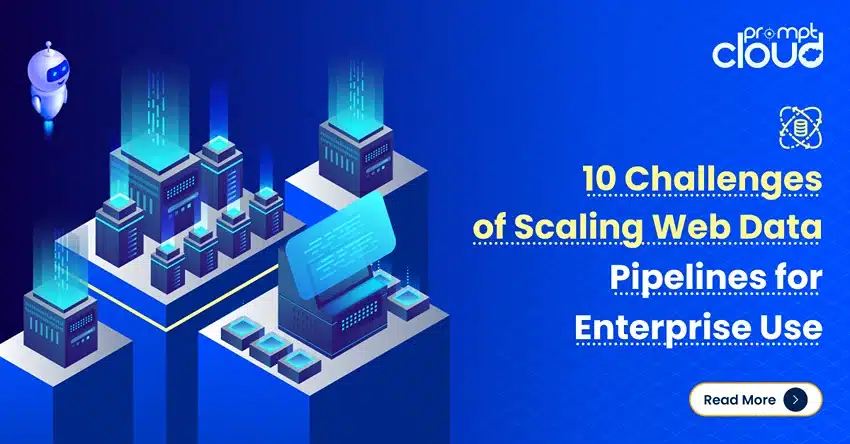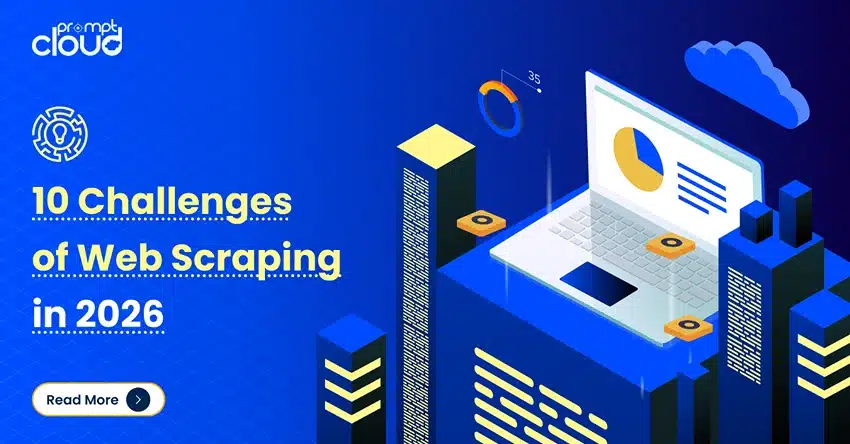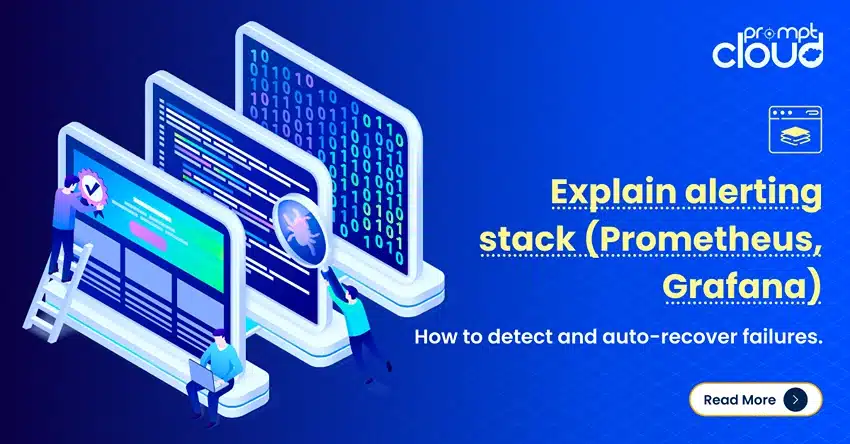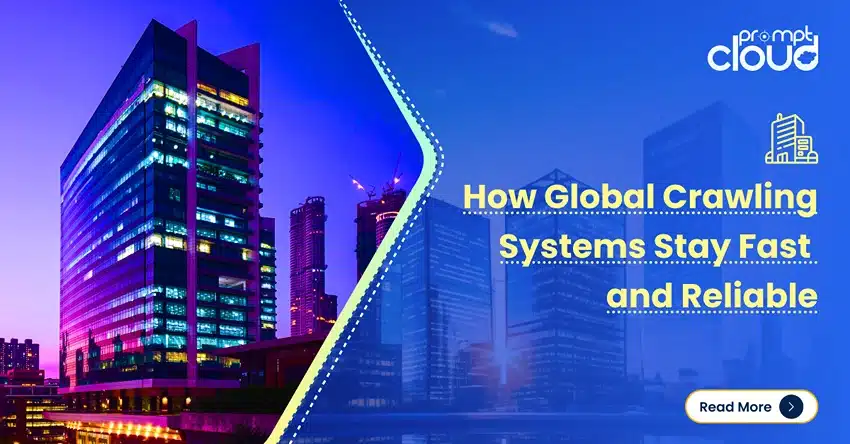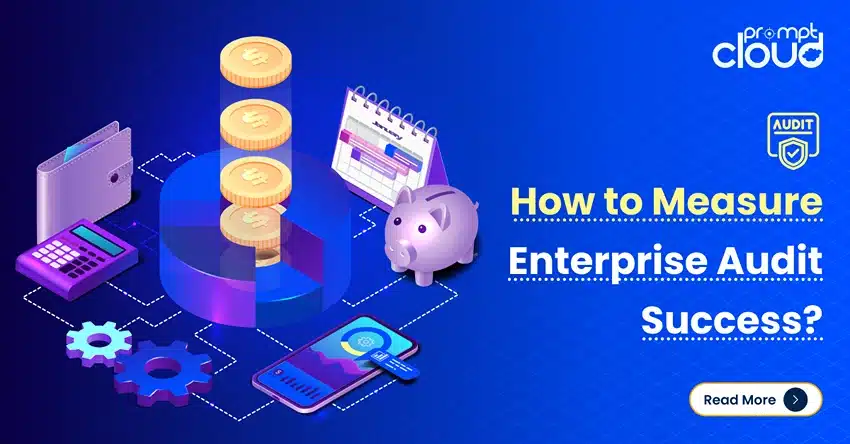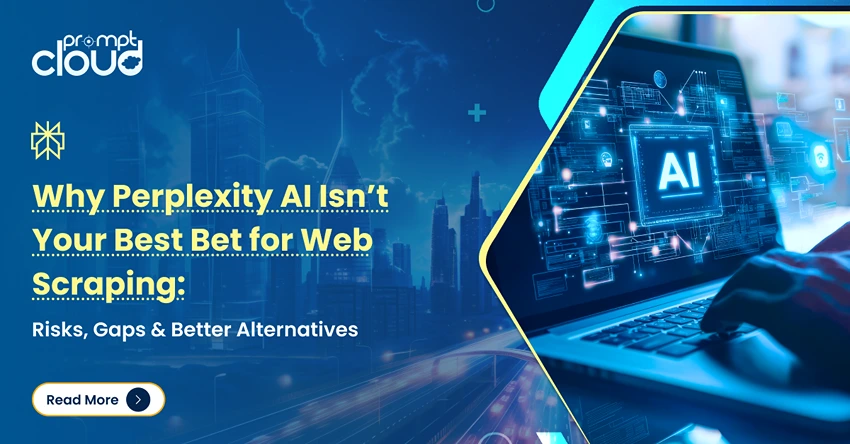
Why Are People Turning to Perplexity AI for Web Scraping?
Perplexity AI has quickly gained popularity as a conversational search engine. It feels smart, intuitive, and fast, almost like talking to a research assistant that brings you answers in seconds. Many users, especially those working in data and tech, are now experimenting with using Perplexity AI as a workaround tool for web scraping. Instead of writing complex code or setting up infrastructure, they ask Perplexity AI to summarize product listings, fetch competitor information, or even monitor reviews.
On the surface, this might sound like a breakthrough. Why go through the hassle of coding selectors or running Python scripts when you can just prompt an AI model and get the data you need?
This growing curiosity around “web scraping with Perplexity AI” has led to a misconception: that it can be used as a reliable and scalable replacement for dedicated web scraping services. It’s an appealing idea for those who want quick wins without investing in robust data pipelines. But that appeal is exactly what makes it risky for professional or business use.
In reality, repurposing Perplexity AI as a Perplexity scraper comes with more limitations than advantages. From data inconsistencies to compliance risks, the tool simply wasn’t built for the complex, large-scale needs of modern data sourcing.
In the next section, we’ll take a deeper look at the core limitations of using Perplexity AI for web scraping and why these gaps can create real problems for businesses.
The Business Risks of Relying on AI for Web Scraping
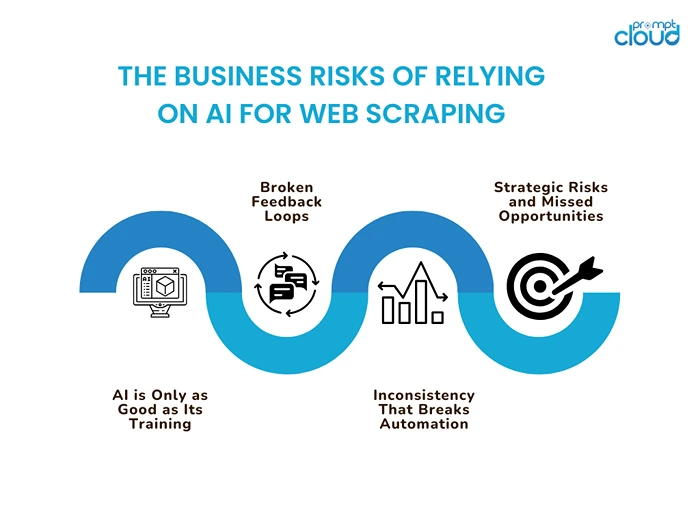
While the convenience of asking a question and getting an answer may feel appealing, businesses can’t afford to treat Perplexity AI like a reliable data pipeline. Web scraping is not just about gathering words from a page—it’s about capturing the right data, in the right format, at the right time. When you rely on a conversational AI to handle this, the risks extend far beyond technical shortcomings. They begin to affect your bottom line.
AI is Only as Good as Its Training
One of the biggest red flags in scraping using AI is that you’re trusting the AI model to understand your data needs. But AI doesn’t always “understand” in the human sense. If the model isn’t trained deeply on a particular domain—say, real estate listings, B2B pricing pages, or niche job boards—it may hallucinate data, misinterpret values, or omit important context.
This becomes even more dangerous when the information looks correct at first glance. A generated product price might be from an old cached version. A summarized review might combine feedback from multiple listings. The problem is, you might not catch these issues until your decisions—pricing, marketing, investment—are already affected.
Broken Feedback Loops
In traditional web scraping services, when data quality drops or errors creep in, you have clear feedback loops. You can inspect logs, rerun jobs, or update selectors. You’re in control.
With Perplexity AI, there is no feedback loop. You can’t teach it to get better at your specific scraping task. You can’t tweak extraction rules. And if it gets something wrong, there’s no structured way to fix or even detect that issue. This creates a blind spot that most businesses simply cannot afford.
Inconsistency That Breaks Automation
Many growth and analytics teams build automation pipelines where scraped data feeds directly into dashboards, reports, or decision engines. That automation relies on a consistent structure—columns staying the same, fields not changing, data types being predictable.
But web scraping with Perplexity AI doesn’t deliver structured outputs. One response might be a paragraph, the next a bullet list, and the third a single sentence. Feeding that into a database or analytics tool is like trying to automate chaos. The effort spent cleaning or normalizing this data could easily outweigh any time savings you thought you were getting.
Strategic Risks and Missed Opportunities
Let’s say your team is monitoring pricing on competitor websites. If you use Perplexity to gather this data and it misses updates or presents old information, you could easily set your prices too high or too low. This affects revenue directly. In industries like travel, e-commerce, or staffing, even a small delay in reacting to market shifts can result in missed bookings, poor conversions, or supply chain misalignment.
For companies relying on real-time market intelligence, this isn’t just inefficient—it’s risky. You’re betting your strategy on a tool that wasn’t built for the job.
The Limitations of Using Perplexity AI for Web Scraping
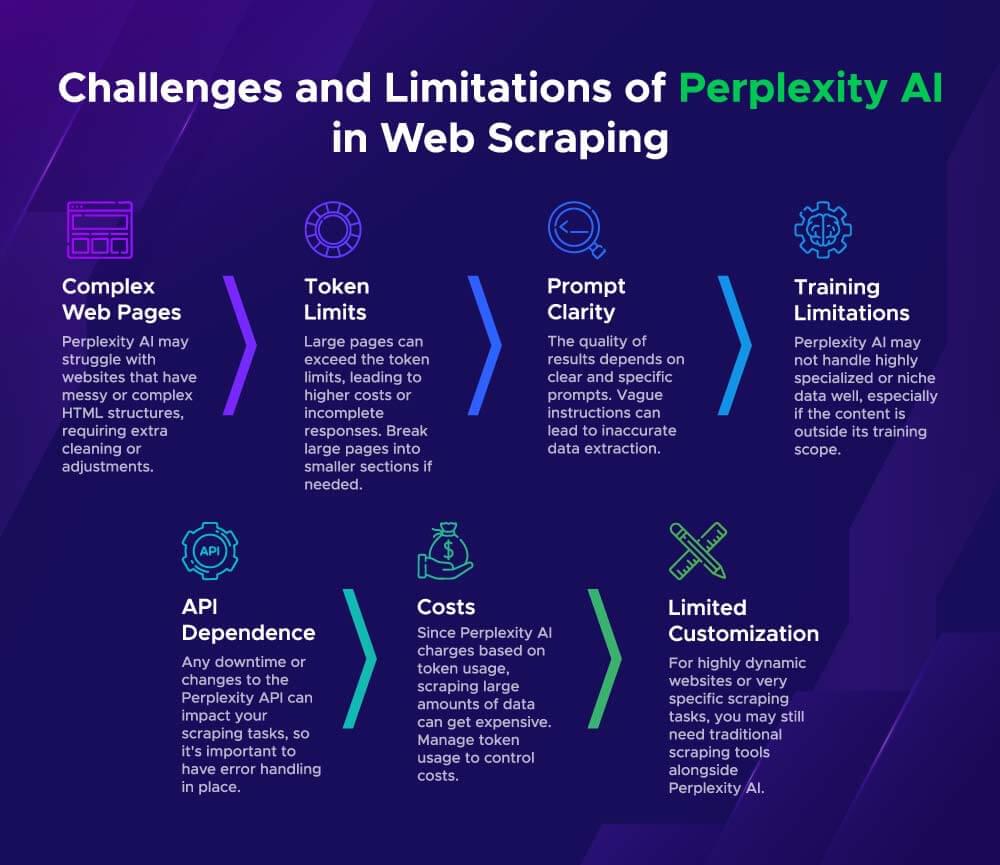
Image Source: crawlbase
While Perplexity AI feels sleek and responsive, it wasn’t designed for the nuts and bolts of web scraping. The underlying goal of this tool is to serve as a conversational answer engine, not a data extraction platform. And when businesses try to use it as a Perplexity scraper, they quickly run into roadblocks that compromise quality, reliability, and scale.
Let’s break down some of the most serious limitations of scraping using AI tools like Perplexity:
1. You Don’t Control the Data Source or Selectors
Traditional web scraping gives you control. You define which websites to target, what HTML elements to extract, and how often the data should be updated. With Perplexity AI, none of that is in your hands. You’re relying entirely on the model’s interpretation of web content, without visibility into what sources it’s pulling from or how it interprets page structures.
This lack of transparency makes it almost impossible to ensure consistency or accuracy, especially if your business relies on structured fields like prices, stock levels, or dates.
2. Data Accuracy Is Often Inconsistent
One of the biggest risks of using Perplexity AI for web scraping is inconsistent data output. Since it summarizes or paraphrases rather than extracts exact values, it’s prone to skipping important context, altering numerical details, or misrepresenting what’s on a webpage. For example, if you ask it to fetch a list of hotel prices or competitor SKUs, there’s no guarantee that it will give you a complete or correct response.
According to a 2024 AI benchmark study by Stanford, large language models hallucinate factual information 3% to 7% of the time in complex retrieval tasks. For casual use, that’s a small margin. For businesses, that’s a red flag.
3. There’s No Scalability or Automation
Scraping one product page manually using prompts is fine if you just need a quick look. But what happens when you need daily updates from hundreds of e-commerce sites? Or when you need to track price fluctuations across regions and currencies?
Perplexity AI doesn’t offer automation, job scheduling, or data pipelines. You can’t run it at scale or plug it into a data warehouse. That makes it unusable for any workflow that requires continuous, structured data collection.
4. Legal and Compliance Uncertainty
Here’s where things get even more concerning. Since Perplexity AI pulls from unknown sources and doesn’t offer logs or a defined crawl strategy, there’s no way to confirm whether the data it provides is compliant with terms of service, robots.txt protocols, or regional data laws like GDPR or CCPA. This gray area could expose businesses to legal trouble, especially if the scraped data is commercialized or redistributed.
In contrast, professional website data scraping services like PromptCloud take legal and ethical boundaries seriously. They use mechanisms to respect site policies, manage request rates, and ensure client-side compliance.
5. Lack of Customization and Formatting
A common requirement in data extraction is formatting. Businesses need scraped data in JSON, CSV, XML, or directly into dashboards or BI tools. With Perplexity AI, you get plain text output, often mixed with summaries or conversational fillers. There’s no schema control, no structured output, and no way to enforce field-level consistency across large datasets.
Put simply: It doesn’t scale, it doesn’t format well, and it doesn’t adapt to your business logic.
Why Accuracy and Control Matter in Web Scraping
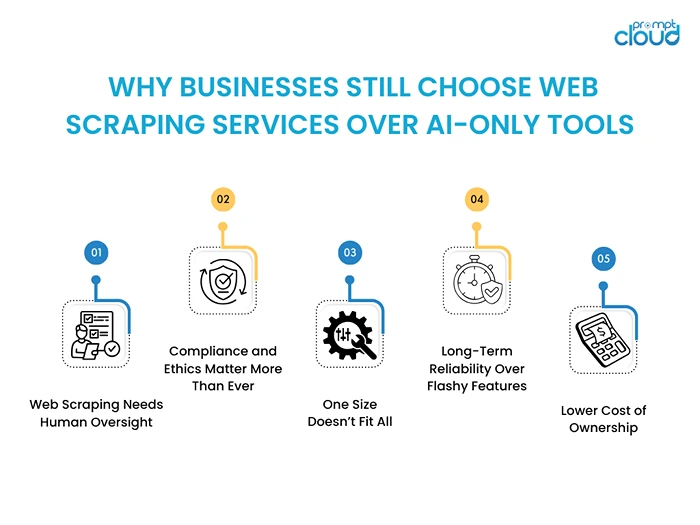
Web scraping isn’t just about pulling text off a webpage. For businesses, it’s about making critical decisions based on that data—decisions that affect pricing, inventory, market research, product development, and even customer experience. That’s why accuracy and control are non-negotiable.
When you use a tool like Perplexity AI for scraping, you lose both.
Structured Data Requires Precision
Imagine a retail analytics team tracking the prices of 5,000 products across 20 competitors. If the tool you’re using confuses old prices with current ones, skips a few listings, or paraphrases instead of extracting the exact figure, the insights you get are flawed. Those flaws ripple into pricing strategies, promotions, and sales forecasting.
In contrast, a dedicated web scraping service extracts data directly from the HTML structure of the page. You get exactly what’s in the source, cleanly structured and organized. That’s not just a nice-to-have—it’s foundational for data science teams, product managers, and growth marketers who rely on accurate inputs to build models and drive campaigns.
Selectors Let You Scrape What You Actually Need
One of the key strengths of web scraping is the ability to use CSS or XPath selectors. These tell the scraper exactly what to look for on the page, whether it’s a price tag, a review title, or a seller rating. You can also filter, exclude, or prioritize fields based on your goals.
With web scraping using AI tools like Perplexity, there are no selectors. You’re at the mercy of whatever the model decides to summarize. That means even if you’re trying to collect data from the same website regularly, you might get different results each time, both in structure and content.
Repeatability and Auditing Are Essential
Professional scraping projects require consistency. If your marketing dashboard updates every Monday with new competitor data, it has to be based on the same logic and fields as last week’s. You also need logs, version control, and historical comparisons. None of this is possible with a conversational AI.
More importantly, if stakeholders ever ask where the data came from or how it was extracted, you should be able to answer with confidence. A black-box tool like Perplexity AI doesn’t offer that transparency, making it unsuitable for any enterprise-grade scraping task.
The Legal and Ethical Risks of Scraping with Perplexity AI
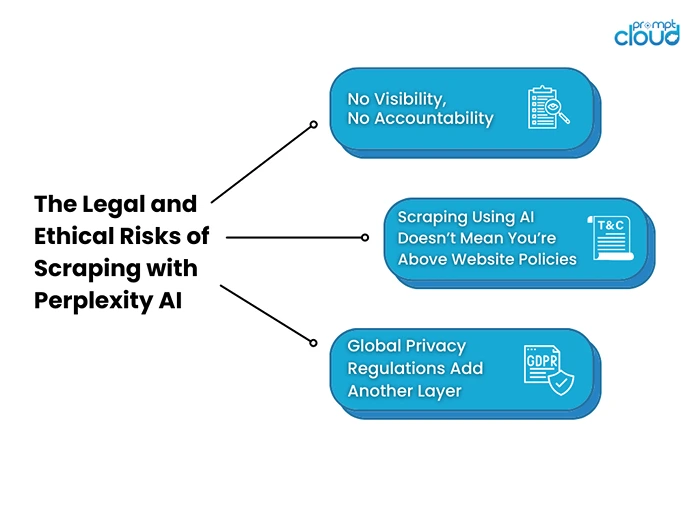
Let’s talk about the elephant in the room, legality. Businesses often assume that if an AI tool is public-facing and gives you an answer, then it must be safe to use for commercial purposes. But that assumption can get you into murky waters, especially when it comes to scraping data using tools like Perplexity AI.
The challenge is this: you don’t really know where the data is coming from.
No Visibility, No Accountability
When you scrape a website the traditional way—using your own crawlers or a web scraping service like PromptCloud—you have full visibility. You know what domains you’re accessing, whether you’re respecting their robots.txt file, and how often you’re making requests. That allows you to stay within legal and ethical boundaries.
With Perplexity AI, you’re getting an answer generated by a model that may have pulled snippets from dozens of sources without attribution. There’s no crawl log. No data trail. No way to audit or prove consent. That might not sound like a big deal for an individual running casual queries, but for a business, it’s a serious blind spot.
Scraping Using AI Doesn’t Mean You’re Above Website Policies
Just because a tool feels hands-off doesn’t mean it is. If you’re indirectly pulling data from a site that explicitly forbids scraping, you’re still responsible for how you use that data, whether a bot did it or an AI model did it for you.
For instance, many popular e-commerce sites have detailed terms of service that prohibit scraping of prices, reviews, and availability information. If an AI tool retrieves that data and you use it in a report, app, or pricing model, it doesn’t protect you from risk.
Global Privacy Regulations Add Another Layer
Privacy laws like GDPR in Europe and CCPA in California are now part of every company’s reality. These laws don’t just cover personal information you collect directly—they also extend to third-party data you process or reuse.
If Perplexity AI returns user-generated content, reviews, or personal data without consent, and you store or use that in your systems, you may be in violation of privacy standards. And because you can’t audit what the AI accessed or how, it’s difficult to fix the issue retroactively.
That’s why businesses are increasingly leaning toward scraping solutions that are transparent, auditable, and built with compliance in mind.
Smarter (and Safer) Alternatives to Using AI for Web Scraping
Using AI to scrape websites might sound clever at first—after all, if a chatbot can answer your questions, why not just ask it to gather data for you too? But once you move past casual use, especially into business needs, it becomes clear: AI wasn’t built for this job.
If your goal is dependable, structured, and legal access to website data, there are many better tools out there. One’s made for exactly this kind of work.
Build Your Scraper (If You Have the Tech Muscle)
If your team has developers who are comfortable with Python and web protocols, building a custom scraper is one option. With libraries like Scrapy or BeautifulSoup, you can target specific fields, control how often pages are scraped, and build logic to handle changes in site layout.
The upside? Full control. The downside? Full responsibility. If something breaks (and it will), you’re the one fixing it. For teams that need one-time data pulls or have tight developer resources, this can become a bit of a time sink.
Use a Managed Web Scraping Service (Like PromptCloud)
This is where most businesses find their sweet spot. A managed service means you don’t have to think about proxies, page load delays, dynamic JavaScript, or keeping up with constantly changing websites.
You tell the provider what you want—say, hotel prices from 50 travel sites or daily inventory from a competitor—and they deliver it, clean and ready to use. The heavy lifting is off your plate. More importantly, you get reliable, structured data without breaking any site policies or risking compliance violations.
It’s like having your own data extraction team, just without needing to hire one.
Tap Into Web Scraping APIs (Quick, but Less Flexible)
Some platforms offer scraping as a plug-and-play API. You send them a URL, and they send you back the data. It’s fast, it’s lightweight, and it’s great for developers who want something in between DIY and done-for-you.
Just be aware: scraping APIs are usually more limited in terms of customization. They might work well for public pages or smaller data needs, but they’re not built for complex workflows or large-scale projects.
Try Visual or No-Code Scraping Tools (When You Don’t Want to Code at All)
If you’re not technical, there are no-code tools that let you click on a webpage and pick what you want to extract—think of them like visual scrapers. They’re easy to use and good for one-off tasks, but not the best for ongoing, automated data collection.
They also tend to struggle with things like infinite scroll, login barriers, or pages that use JavaScript to load content. So they’re good for getting your feet wet, but probably not a long-term solution for serious data teams.
So, What’s the Better Choice?
AI tools like Perplexity are great for casual Q&A, quick research, and summarizing text. But when it comes to pulling reliable, structured data from the web—at scale, legally, and consistently—you’re going to want something purpose-built.
Whether that’s a custom-built scraper, an API, or a managed service like PromptCloud depends on your goals and your team’s bandwidth. The key is choosing a tool that was designed for data extraction, not a chatbot that happens to do it sometimes.
Why PromptCloud is a Smarter Choice for Web Scraping at Scale
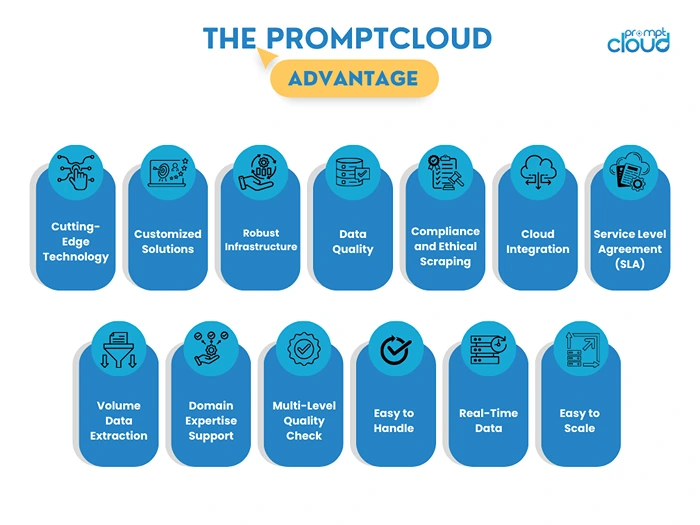
AI tools like Perplexity AI are undeniably clever. They’re quick, conversational, and great at summarizing ideas or pointing you in the right direction. But here’s the thing: just because something can give you an answer doesn’t mean it’s the right tool for pulling structured, reliable web data. And when businesses start using AI chatbots to replace proper web scraping workflows, that’s where things start to fall apart.
Whether it’s inconsistent outputs, lack of source visibility, or the inability to automate and audit, web scraping with Perplexity and similar AI tools simply isn’t reliable for teams that need dependable data pipelines. You’re left guessing where the data came from, how accurate it is, and whether you’re even allowed to use it. That’s a risky place to be, especially when data drives your product strategy, pricing, or customer insights.
That’s where PromptCloud steps in.
As a trusted provider of enterprise-grade web scraping services, PromptCloud offers the kind of stability and precision that AI tools can’t. We build custom crawlers tailored to your needs, whether you’re tracking e-commerce product listings, monitoring job boards, analyzing reviews, or watching news and blogs for industry trends.
And it’s not just about getting the data. It’s about getting it right—legally, cleanly, and consistently. We offer:
- Full transparency into your scraping strategy
- Compliance with site terms, robots.txt protocols, and global privacy regulations
- Structured, ready-to-use output delivered through APIs, FTP, or cloud storage
- Human support to adapt to changing site structures or new business goals
- Infrastructure that scales with your data needs, no prompts or guesswork required
For data analysts, growth marketers, product managers, and technical decision-makers, the question isn’t whether AI is useful. It’s about using the right tool for the job. When the job is web scraping, a conversational chatbot won’t cut it. You need a real solution built from the ground up to extract web data at scale, securely and responsibly.Looking to ditch the limitations of AI scraping? Talk to us. We’ll help you get the data you actually need, without the uncertainty.










